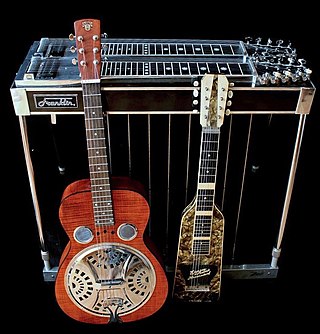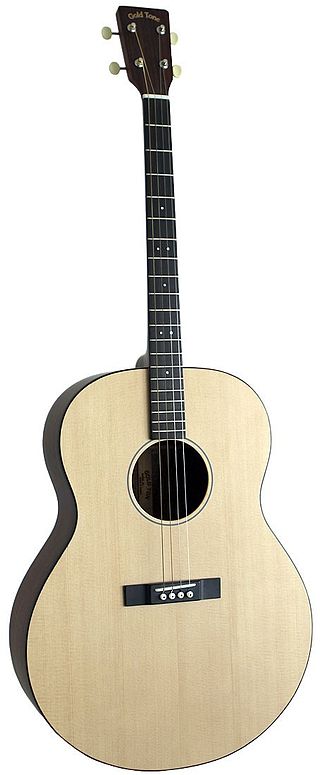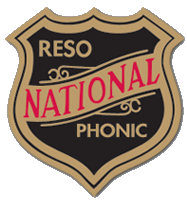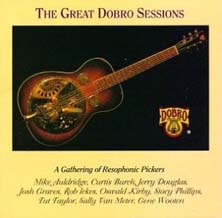Rickenbacker International Corporation is a string instrument manufacturer based in Santa Ana, California. The company is credited as the first known maker of electric guitars – a steel guitar in 1932 – and today produces a range of electric guitars and basses.

A steel guitar is any guitar played while moving a steel bar or similar hard object against plucked strings. The bar itself is called a "steel" and is the source of the name "steel guitar". The instrument differs from a conventional guitar in that it is played without using frets; conceptually, it is somewhat akin to playing a guitar with one finger. Known for its portamento capabilities, gliding smoothly over every pitch between notes, the instrument can produce a sinuous crying sound and deep vibrato emulating the human singing voice. Typically, the strings are plucked by the fingers of the dominant hand, while the steel tone bar is pressed lightly against the strings and moved by the opposite hand.

Dobro is an American brand of resonator guitars owned by Gibson and manufactured by its subsidiary Epiphone. The term "dobro" is also used as a generic term for any wood-bodied, single-cone resonator guitar.

The pedal steel guitar is a console-type of steel guitar with pedals and knee levers that change the pitch of certain strings to enable playing more varied and complex music than other steel guitar designs. Like all steel guitars, it can play unlimited glissandi and deep vibrati—characteristics it shares with the human voice. Pedal steel is most commonly associated with American country music and Hawaiian music.

The lap steel guitar, also known as a Hawaiian guitar, is a type of steel guitar without pedals that is typically played with the instrument in a horizontal position across the performer's lap. Unlike the usual manner of playing a traditional acoustic guitar, in which the performer's fingertips press the strings against frets, the pitch of a steel guitar is changed by pressing a polished steel bar against plucked strings. Though the instrument does not have frets, it displays markers that resemble them. Lap steels may differ markedly from one another in external appearance, depending on whether they are acoustic or electric, but in either case, do not have pedals, distinguishing them from pedal steel guitars.

The Stroh violin or Stroviol is a type of stringed musical instrument that is mechanically amplified by a metal resonator and horn attached to its body. The name Stroviol refers to a violin, but other instruments have been modified with the amplification device, including the viola, cello, double bass, ukulele, mandolin, and guitar. Johannes Matthias Augustus Stroh, an electrical engineer from Frankfurt, invented the instrument in London in 1899.

The tenor guitar or four-string guitar is a slightly smaller, four-string relative of the steel-string acoustic guitar or electric guitar. The instrument was initially developed in its acoustic form by Gibson and C.F. Martin so that players of the four-string tenor banjo could double on guitar.
John Dopyera was a Slovak-American inventor and entrepreneur, and a maker of stringed instruments. His inventions include the resonator guitar and important contributions in the early development of the electric guitar.

A resonator guitar or resophonic guitar is an acoustic guitar that produces sound by conducting string vibrations through the bridge to one or more spun metal cones (resonators), instead of to the guitar's sounding board (top). Resonator guitars were originally designed to be louder than regular acoustic guitars, which were overwhelmed by horns and percussion instruments in dance orchestras. They became prized for their distinctive tone, and found life with bluegrass music and the blues well after electric amplification solved the problem of inadequate volume.

The National String Instrument Corporation was an American guitar company first formed to manufacture banjos and then the original resonator guitars. National also produced resonator ukuleles and resonator mandolins. The company merged with Dobro to form the "National Dobro Company", then becoming a brand of Valco until it closed in 1968.

The Regal Musical Instrument Company is a former US musical instruments company and current brand owned by Saga Musical Instruments. Regal was one of the largest manufacturers in the 1930s and became known for a wide range of resonator stringed instruments, including guitars, mandolins, and ukuleles. Only resonator guitars are sold under the Regal brand today, with manufacturing in Korea and distribution in San Francisco, United States.

National Reso-Phonic Guitars is a manufacturer of resonator guitars and other resonator instruments including resonator mandolins, tenor instruments, and resonator ukuleles.

The Rickenbacker Electro A-22, nicknamed the "Frying Pan" is the first electric lap steel guitar. Developed in 1931/1932, it received its patent in August 1937. A previous attempt, the Stromberg company‘s transducer-based "Stromberg Electro", was introduced in 1928. It used a "vibration-transfer rod" from the instrument's sounding board attached to magnets inside the guitar, and was not successful. George Beauchamp created the "Fry-Pan" in 1931, and it was subsequently manufactured by Rickenbacker Electro. The instrument gained its nickname because its circular body and long neck make it resemble a frying pan.
Valco was a US manufacturer of guitar amplifiers from the 1940s through 1968.

The Great Dobro Sessions is a 1994 country music and bluegrass album featuring an all-star line-up of 10 American resonator guitar players, produced by dobro players Jerry Douglas and Tut Taylor.

A resonator mandolin or "resophonic mandolin" is a mandolin whose sound is produced by one or more metal cones (resonators) instead of the customary wooden soundboard. These instruments are sometimes referred to as "Dobro mandolins," after pioneering instruments designed and produced by the Dopyera Brothers, which evolved into a brand name. The trademark "Dobro" is currently the property of the Gibson Guitar Corporation. When Gibson acquired the trademark in 1993, they announced that they would defend their right to its exclusive use.

The lap steel ukulele is a type of and method of playing the ukulele

Beltona Resonator Instruments is a UK musical instruments manufacturing company based in Leeds, West Yorkshire. Since its foundation, Beltona has been producing resonator instruments, more specifically guitars, mandolins and ukuleles.
Bear Creek Guitars is a California-based manufacturer of Hawaiian instruments. Luthier Bill Hardin founded the company in Hawaii in 1995 after working at O.M.I Dobro and the Santa Cruz Guitar Company. Bear Creek primarily builds acoustic lap steel guitars in the tradition of the Weissenborn, one of only a handful of manufacturers basing their instruments on the original Weissenborn design. Hardin has collaborated with guitarist and ethnomusicologist Bob Brozman in designing an updated 7-string baritone version of the Style IV Weissenborn, called the BearTone.
















